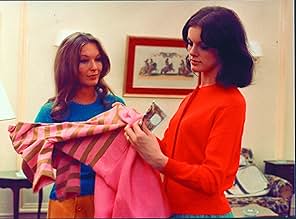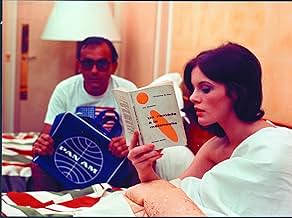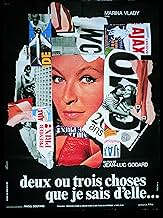2 ou 3 choses que je sais d'elle
- 1967
- Tous publics
- 1h 27m
A day in the life of a Parisian housewife/prostitute, interspersed with musings on the Vietnam War and other contemporary issues.A day in the life of a Parisian housewife/prostitute, interspersed with musings on the Vietnam War and other contemporary issues.A day in the life of a Parisian housewife/prostitute, interspersed with musings on the Vietnam War and other contemporary issues.
- Director
- Writers
- Stars
- Awards
- 1 nomination total
- Narrator
- (voice)
- Young Man
- (uncredited)
- Girl Talking to Robert
- (uncredited)
- Girl in Bath
- (uncredited)
- Christophe Jeanson
- (uncredited)
- Meter Reader
- (uncredited)
- Marianne
- (uncredited)
- Monsieur Gehrard
- (uncredited)
- Girl
- (uncredited)
- Man in Basement
- (uncredited)
- Author
- (uncredited)
- Pécuchet
- (uncredited)
- John Bogus
- (uncredited)
- Woman in Basement
- (uncredited)
- Bouvard
- (uncredited)
- Robert Jeanson
- (uncredited)
- Roger
- (uncredited)
- Director
- Writers
- All cast & crew
- Production, box office & more at IMDbPro
Featured reviews
I'm not a fan of the New Wave -- Truffaut, Demy, Malle and Rohmer occasionally excepted -- but this soon reveals itself as an exercise in the failings of modern society and the people within it. Everyone is disconnected from other human beings, everyone feels hopeless and is just going through the motions and no one tries to view anything as a more than a collection of unrelated attributes. It is possible, of course, that Godard has produced a satire of current French philosophy, with everyone well-dressed in the latest fashions, smoking American cigarettes and drinking Coca-Cola, and Raoul Levy showing up as "John Bogus, the American", wearing a t-shirt with an American flag and claiming to be a photo-journalist.
I do have an urge to smack every cast member, and that is why I think it may be a satire about hyper-intellectuals who are so wise they are miserable, so assured in their beliefs that they believe nothing, so brave in their solitude that they refuse to trust anyone.
But I think not.
That said; I feel people shouldn't be so quick to dismiss the film, as it features several scenes of bold technical invention, a sharp and biting wit and a real sense of both visual and thematic imagination. It is also a fairly worthy time capsule to the spirit and scope of Paris at this particular time, expressing many of the political fears and social concerns central to most free-thinking Parisians circa 1967. Whereas the two other Politically minded films that Godard produced in 1967 would broaden the thematic scope to create a much more pointed attack on armchair terrorists and bourgeois revolutionaries, "2 or 3 Things" works on a much smaller scale; choosing suburban Paris with its high-rise apartment buildings, shops and service stations as a backdrop that is continually dwarfed by the wheels of industry and industrial repair. At one point Godard says in voice over that "the landscape is like a face", all the while showing how it is continually destroyed, changed and re-developed in a series of repetitive visual metaphors open to a variety of thematic interpretations. Many viewers take these sequences at face value and choose to view the film as a simple, heavy-handed essay on the decline of industry and the rise of Capitalism and subsequently write the film off. However, even though the film takes a great deal of work and may indeed seem boring and heavy-handed, there are deeper themes and ideas that make this a slightly more rewarding work in the long run.
Once again, Godard anchors his ideas to the theme of prostitution; recalling elements of Vivre sa Vie (1962) whilst simultaneously foreshadowing certain issues later expressed in Sauve qui peut (la vie) (1980). Like the latter film, Godard implies that with an increasing focus on consumerism and the pursuit of material gain, society is prostituting itself. This is further elaborated upon by Godard's continual focus on product logos and brand names that are inter cut and often re-framed in order to create humorous puns that are probably lost on anyone not entirely familiar with the French language, as well as a final shot that renders the cityscape of suburban Paris as the ultimate consumer paradise. The idea of prostitution also extends to the main character, who here, prostitutes herself in order to break up the monotony of her everyday life, whilst also featuring as a somewhat controversial comment on acting itself (something that is further implied in the opening scene).
Like many of Godard's films, "2 or 3 Things" uses a great deal of humour to give the satire a more pointed attack. Much of this humour tends to go over the heads of most viewers, largely as a result of having to read the subtitles or simply missing out on much of Godard's clever use of wordplay and usually ironic puns. Scenes, such as the young boy relating his dream about the unification of North and South Vietnam, or the scene in which Juliet and her friend enact a bizarre, tongue-in-cheek sex game with a foreign war correspondent (who films them with a super 8 camera and looks a little like Godard himself), all the while cutting back and forth to shots of construction and cars entering a service station, being an incredibly bold and rebellious critique in itself. Other sections of the film seem more poetic; almost as if Godard is putting his thoughts on film as he goes along and creating something that is, on the one hand, entirely personal, whilst simultaneously being an obvious piece of satirical agitprop. The two strands don't always sit well together, and too often Godard's ideas seem strained and unformed; especially in comparison with those two other films from 1967, previously mentioned.
Obviously many viewers have had problems with the film, and really, your enjoyment of it will depend greatly on how much you trust Godard's instincts as both a satirist and filmmaker, and how willing you are to enter into a dialog with him on a subject that is now resigned to an incredibly brief footnote in 20th century history. For me, the film is undoubtedly one of his more difficult projects and not one that I would place higher than the likes of Le Mepris (1963), Pierrot le fou (1965) or Helas pour moi (1993), etc. However, the scope of Godard's ideas and his way of presenting them visually are close to genius, whilst the occasional moment of imaginative wit, visual poetry or the sheer verve of Godard's film-making abilities make the slow pace and poor performance from Marina Vlady all the more bearable. 2 or 3 Things I Know About Her is worth seeing in the context of both Week End and La Chinoise and is certainly worth experiencing as a double bill with the similarly themed Sauve qui peut (la vie).
French's student movement turned into something of a cinema movement. To a small group of devoted young cinephiles, French film seemed like a cheap art - one capable of so much more but settled for so very little. Nobody seemed to want to experiment or toy with the medium in anyway. That is until Godard hit the scene, boasting a more assured and confident enigma and housing extremely radical and challenging themes and stylistic choices few had seen before.
I equate Godard's films to bad sex because it isn't until after watching them and reading a few thoughts by a miscellaneous bunch online do I realize if I liked them or not. His films are challenging because while watching them, you're sometimes lost in what they're trying to convey. But once you find an idea or some aesthetic attributes to latch on to, dissecting the film is a much easier process. In that respect, Godard's films may also be like an algebra test.
2 or 3 Things I Know About Her, however, is sex I never got around to fully enjoying and an algebra test I was never able to pass in the long-run. The film is nowhere near as indescribable or as impossibly vague and empty as Godard's latest work Film Socialisme, but its ability to baffle even fifty years late still holds true. This is a cinematic enigma like few others with sequences ranging from digestible and accessible to a complete mystery on my behalf.
What little coherent narrative there is focuses on Juliette Jeanson (Marina Vlady), a married bourgeois mother who begins her descent into prostitution. She drops her child off at a friend's who runs a business of watching the children of prostitutes before going about her day of shopping, cleaning the house, and meeting new clients. Godard's uniqueness in regard to the story is that he makes all of the sex lack any shred of eroticism and instead makes it rather silly (IE: a man makes a woman wear a shopping bag over her head).
Godard consistently interrupts this narrative with shots of whatever he feels like pointing the camera at with soft-spoken narration added over the images. Godard's narration often doesn't make a lot of sense, but his unpredictable comments and remarks provide the film with or feeling that he is watching this picture with us and giving his own commentary as it progresses.
During the time of 2 or 3 Things I Know About Her's release (1967 to be specific), Godard had become outspoken about his opposition towards Americanization and the ideas of the country as a whole. In the late sixties, prolific advertising began to turn up and, consequently, Godard saw this as an attack and began vocalizing his disdain for advertising. Frequently punctuating this particular picture are stray images of pop art, akin to the style Andy Warhol was famous for.
Of course, the meaning for the inclusions of these images is anyone's guess really. Godard makes his impressionistic style known and present and leaves us to form the thesis out of his work for ourselves it seems. This is one of the issues with this film as a whole. A film should never feel like it is handing you a series of clips and telling you to form an idea out of them without giving you a starting point or an anchor to latch on to. Even in the most impressionistic films by people like Ron Fricke or Gus Van Sant, there is a basic idea or concept that one can attach themselves to in order to try and form some ideas about the film's message.
Godard never seems to give us a starting point with 2 or 3 Things I Know About Her other than a compilation of clips that could very well have a deeper meaning if we knew just where the hell to begin. The pop art/advertising angle is something to go off of, but the film doesn't seem to focus on that nearly enough for it to be the main theme. And with that, even Juliette just seems like a character Godard includes to simply emphasize his appreciation and admiration for prostitutes.
As damning as 2 or 3 Things I Know About Her so often is, the film looks bright, crisp, and extremely clear thanks to the cinematography of Godard's frequent collaborator Raoul Coutard. Coutard gives the film a refined and aesthetically beautiful look, even if what he's showing us doesn't pack in a lot of clarity or real sense. As a film, 2 or 3 Things I Know About Her baffles beyond belief and fails at stringing together a coherent and digestible narrative. As an essay on film, it kinda works - if only I didn't have to cheat to figure out what could be an acceptable answer to it.
Starring: Marina Vlady. Directed by: Jean-Luc Godard.
Did you know
- TriviaWhen Juliette drops off her daughter at the day care/brothel, there is a painting on the wall of a screen shot of Nana Kleinfrankenheim, portrayed by Anna Karina, in Vivre sa vie: Film en douze tableaux (1962).
- Quotes
Narrator: Since social relations are always ambiguous, since my thoughts divide as much as unite, and my words unite by what they express and isolate by what they omit, since a wide gulf separates my subjective certainty of myself from the objective truth others have of me, since I constantly end up guilty, even though I feel innocent, since every event changes my daily life, since I always fail to communicate, to understand, to love and be loved, and every failure deepens my solitude, since - since - since I cannot escape the objectivity crushing me nor the subjectivity expelling me, since I cannot rise to a state of being nor collapse into nothingness - I have to listen, more than ever I have to look around me at the world, my fellow creature, my brother.
- ConnectionsEdited into Notes pour Debussy - Lettre ouverte à Jean-Luc Godard (1988)
Details
- Release date
- Country of origin
- Languages
- Also known as
- Deux ou trois choses que je sais d'elle
- Filming locations
- Production companies
- See more company credits at IMDbPro
Box office
- Gross US & Canada
- $104,038
- Opening weekend US & Canada
- $11,214
- Nov 19, 2006
- Gross worldwide
- $104,038
- Runtime
- 1h 27m(87 min)
- Sound mix
- Aspect ratio
- 2.35 : 1



























